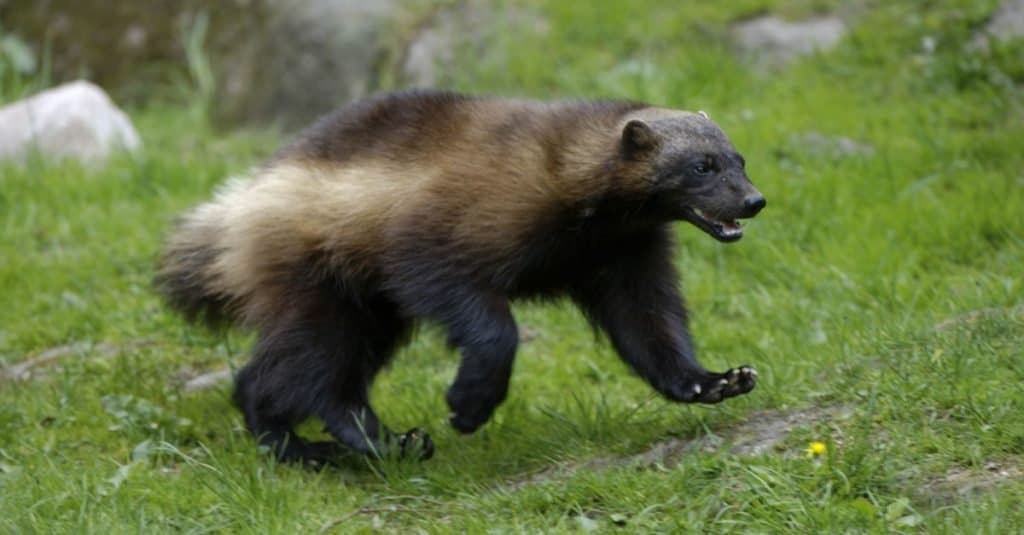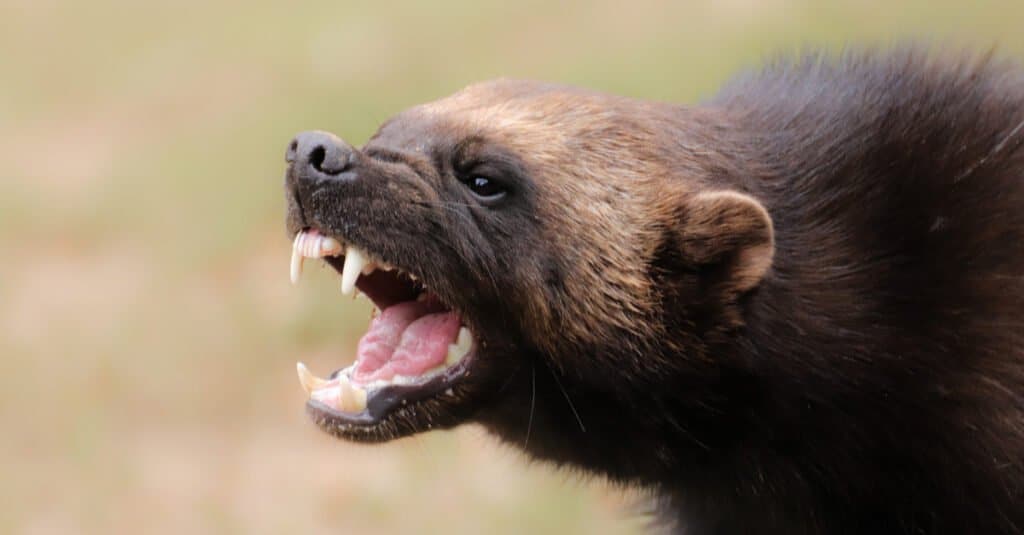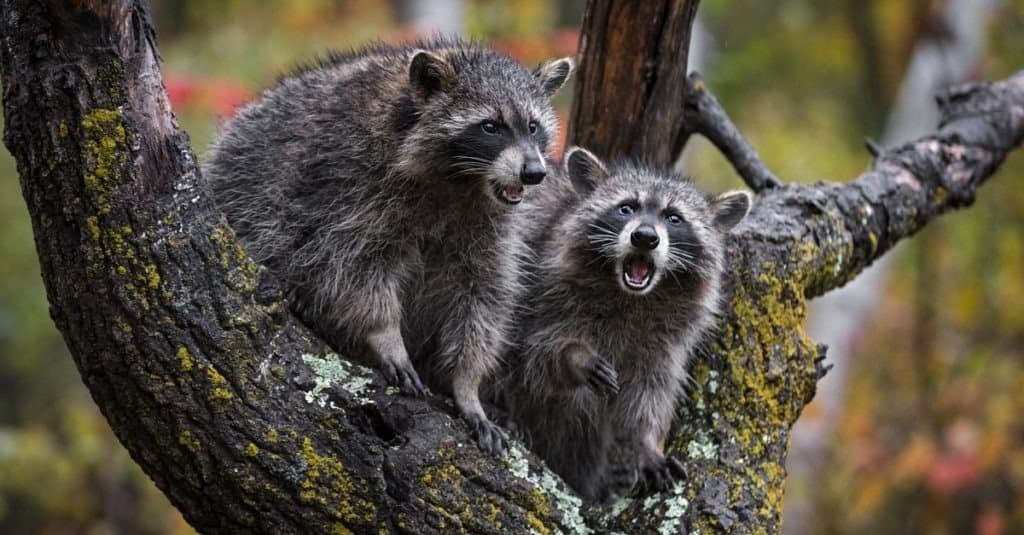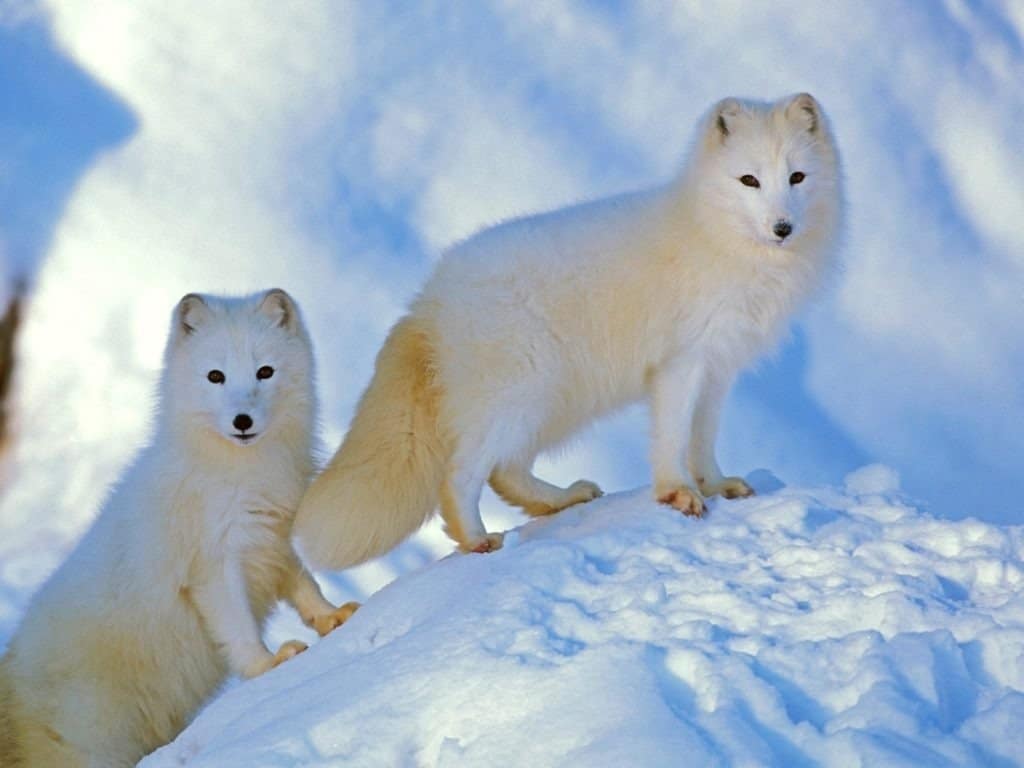Wolverines are popular team mascots because of their fierce reputation. The University of Michigan is the most famous college that has wolverines as their mascot. Ironically, wolverines do not live in Michigan, they are found in only a few states including Washington, Montana, Idaho, Wyoming, and a small part of Oregon. Preferring cold temperatures, they can also be found in Alaska, Canada, and Russia. They only weigh about 40lbs, the size of a border collie. So are wolverines dangerous? Have they ever attacked people? Let’s find out!
What is a wolverine?

Wolverines are short and stocky.
©Bildagentur Zoonar GmbH/Shutterstock.com
Wolverines look similar to small bears but they are actually large weasels, the largest of the weasel family. They have short legs and a stout body with a long bushy tail at the end. Their fur is dark brown to black with a light brown stripe of fur circling the main body. Their paws look too big for their bodies and have sharp claws at the end. Wolverines are sometimes called skunk bears because they can release a strong odor similar to skunks. Adult males can get to be 26-34 inches long plus another 7-10 inches of bushy tail.
Are Wolverines dangerous?

Wolverines have a reputation for being aggressive and bad-tempered.
©DenisaPro/Shutterstock.com
Yes, wolverines are dangerous. They are aggressive animals and have been videotaped fighting wolves over a kill. Can you imagine a wolverine finding two wolves snacking on a dead carcass and it decides to take them both on? This may be the exception since wolves are capable of killing the smaller wolverine but it shows their boldness. Despite their fierceness, they do not seem to be dangerous to people.
Do Wolverines attack people?
There are no documented wolverine attacks on people. One reason may be that wolverines have very little interaction with humans. They prefer arctic weather and can live in secluded mountains far from civilization. They have a reputation for ransacking cabins disheveling everything, eating the food, and leaving their pungent scent behind. Very annoying but not necessarily dangerous.
Do wolverines carry rabies?

.There is only one documented case of a wolverine having rabies in North America.
©Geoffrey Kuchera/Shutterstock.com
Wolverines can carry rabies but it is almost unheard of. Rabies only occurs in mammals with raccoons, skunks, foxes, and bats being the most common carriers. A report by the Alaskan Fish and Wildlife stated that there was never a documented case of a wolverine having rabies until 2012. A dead wolverine was found on the North Slope and after necropsy, it was discovered to have rabies. The CDC confirmed the case and found it was the same kind that is found in the arctic fox. Both arctic fox and wolverines live in the same area. This is the only documented case of a wolverine having rabies in North America, so it is extremely rare.

Arctic foxes are known carriers of rabies, especially in Alaska.
©rokopix/Shutterstock.com
Do wolverines carry other diseases?
Just recently a new disease has been found in wolverines and it is concerning. Canadian Wildlife agencies are researching cases of a Trichinella parasite that can survive in freezing temperatures. Wolverines in Canada have tested positive for this parasite. People can get infected with Trichinellosis which causes symptoms like fever, diarrhea, and overall achiness. The concern in Northwest Canada is that First Nation people hunt in these areas and while they don’t hunt wolverines for food, the wolverines can spread the parasite to animals like moose and caribou.
Are wolverines dangerous to other wolverines?

Wolverines can attack other wolverines. They are very territorial.
©Maksim – Public Domain by US National Park Service – License
Wolverines are solitary animals and are very territorial. They will chase other wolverines away and fight if they need to. Wolverines have powerful jaws with two large canines on top and bottom. They also have strong sharp claws so they are certainly equipped to put up a good fight.
In a research study in Sweden, they looked at what the cause of death was in a group of wolverines (as well as brown bears and wolves). They studied 27 wolverines and found that the most common cause of death for this group was “traumatic injury inflicted by other predators or wolverines”. 11 of the 27 fell into this group, with 4 of the 11 being killed by other wolverines and the remaining 7 being uncertain. Just looking at a small sample size of 27 it seems surprising that 4 were killed by their own species. So wolverines are dangerous to other wolverines for sure!
Are wolverines dangerous to pets?
They can be dangerous to pets. On November 14, 2019, the Alaska Department of Fish and Game alerted the public to a series of wolverine attacks on pets in the area. Although it was very uncommon to have wolverines in neighborhoods, several incidents had been noted. One woman reported getting woken up by her barking dog who alerted her to a cat that was in the middle of a fight with a wolverine. It was short-lived and neither the cat nor the wolverine seemed to be injured. Officials also reported that “recent incidents resulted in the deaths of pet rabbits, chickens, and livestock”. They advised people to be on the lookout and be especially careful when letting pets out at night or before dawn. They also mentioned that due to wolverines’ keen sense of smell, people should keep all garbage secured, food for pets and livestock put away.
Do wolverines kill livestock like sheep and cattle?

Wolverines can attack livestock like sheep and cattle.
©kallerna, Public domain, via Wikimedia Commons – License
Yes. They are often hunted by humans because they steal and kill livestock like sheep and cattle. Ranchers get frustrated by the crafty wolverines. In Evanston, Wyoming, one rancher reported that he lost 18 sheep over a couple of days. Not only is this a problem, but it is also very expensive. He said a ewe can be $350-$450 each, so losing 18 is a loss of $6,300-$8,100! Wyoming Game and Wildlife Department are working with authorities from Utah as well to help track the wolverines and relocate them when needed to limit human-animal conflict.
The photo featured at the top of this post is © DenisaPro/Shutterstock.com
Thank you for reading! Have some feedback for us? Contact the AZ Animals editorial team.





